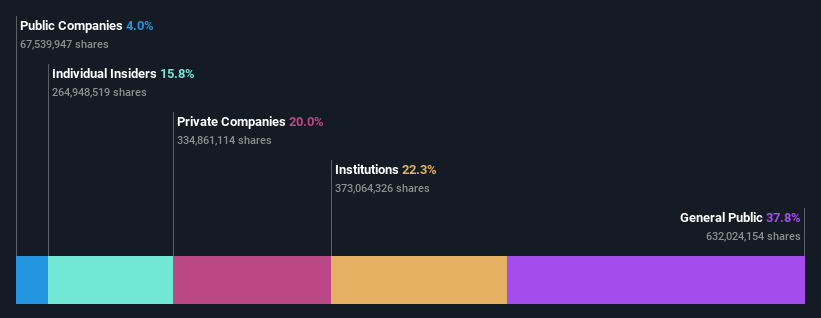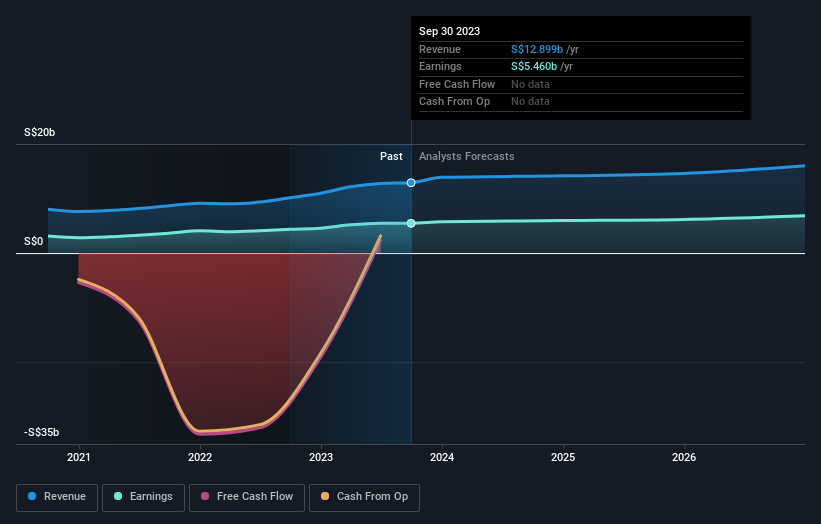United Overseas Bank Limited (SGX:U11) most popular amongst retail investors who own 38% of the shares, institutions hold 22%

Key Insights
- United Overseas Bank's significant retail investors ownership suggests that the key decisions are influenced by shareholders from the larger public
- A total of 15 investors have a majority stake in the company with 50% ownership
- 16% of United Overseas Bank is held by insiders
If you want to know who really controls United Overseas Bank Limited (SGX:U11), then you'll have to look at the makeup of its share registry. The group holding the most number of shares in the company, around 38% to be precise, is retail investors. Put another way, the group faces the maximum upside potential (or downside risk).
And institutions on the other hand have a 22% ownership in the company. Generally speaking, as a company grows, institutions will increase their ownership. Conversely, insiders often decrease their ownership over time.
Let's take a closer look to see what the different types of shareholders can tell us about United Overseas Bank.
Check out our latest analysis for United Overseas Bank

What Does The Institutional Ownership Tell Us About United Overseas Bank?
Institutions typically measure themselves against a benchmark when reporting to their own investors, so they often become more enthusiastic about a stock once it's included in a major index. We would expect most companies to have some institutions on the register, especially if they are growing.
We can see that United Overseas Bank does have institutional investors; and they hold a good portion of the company's stock. This implies the analysts working for those institutions have looked at the stock and they like it. But just like anyone else, they could be wrong. If multiple institutions change their view on a stock at the same time, you could see the share price drop fast. It's therefore worth looking at United Overseas Bank's earnings history below. Of course, the future is what really matters.

We note that hedge funds don't have a meaningful investment in United Overseas Bank. Looking at our data, we can see that the largest shareholder is Cho-Yaw Wee with 11% of shares outstanding. With 8.0% and 5.2% of the shares outstanding respectively, Wee Investments Pte Ltd and Wah Hin & Co Pte Ltd are the second and third largest shareholders. Furthermore, CEO Ee Cheong Wee is the owner of 2.6% of the company's shares.
Looking at the shareholder registry, we can see that 50% of the ownership is controlled by the top 15 shareholders, meaning that no single shareholder has a majority interest in the ownership.
While studying institutional ownership for a company can add value to your research, it is also a good practice to research analyst recommendations to get a deeper understand of a stock's expected performance. There are plenty of analysts covering the stock, so it might be worth seeing what they are forecasting, too.
Insider Ownership Of United Overseas Bank
While the precise definition of an insider can be subjective, almost everyone considers board members to be insiders. The company management answer to the board and the latter should represent the interests of shareholders. Notably, sometimes top-level managers are on the board themselves.
I generally consider insider ownership to be a good thing. However, on some occasions it makes it more difficult for other shareholders to hold the board accountable for decisions.
Our information suggests that insiders maintain a significant holding in United Overseas Bank Limited. Insiders own S$7.5b worth of shares in the S$47b company. That's quite meaningful. Most would say this shows a good degree of alignment with shareholders, especially in a company of this size. You can click here to see if those insiders have been buying or selling.
General Public Ownership
With a 38% ownership, the general public, mostly comprising of individual investors, have some degree of sway over United Overseas Bank. While this size of ownership may not be enough to sway a policy decision in their favour, they can still make a collective impact on company policies.
Private Company Ownership
We can see that Private Companies own 20%, of the shares on issue. It's hard to draw any conclusions from this fact alone, so its worth looking into who owns those private companies. Sometimes insiders or other related parties have an interest in shares in a public company through a separate private company.
Public Company Ownership
Public companies currently own 4.0% of United Overseas Bank stock. It's hard to say for sure but this suggests they have entwined business interests. This might be a strategic stake, so it's worth watching this space for changes in ownership.
Next Steps:
It's always worth thinking about the different groups who own shares in a company. But to understand United Overseas Bank better, we need to consider many other factors. Consider risks, for instance. Every company has them, and we've spotted 1 warning sign for United Overseas Bank you should know about.
If you would prefer discover what analysts are predicting in terms of future growth, do not miss this free report on analyst forecasts.
NB: Figures in this article are calculated using data from the last twelve months, which refer to the 12-month period ending on the last date of the month the financial statement is dated. This may not be consistent with full year annual report figures.
New: AI Stock Screener & Alerts
Our new AI Stock Screener scans the market every day to uncover opportunities.
• Dividend Powerhouses (3%+ Yield)
• Undervalued Small Caps with Insider Buying
• High growth Tech and AI Companies
Or build your own from over 50 metrics.
Have feedback on this article? Concerned about the content? Get in touch with us directly. Alternatively, email editorial-team (at) simplywallst.com.
This article by Simply Wall St is general in nature. We provide commentary based on historical data and analyst forecasts only using an unbiased methodology and our articles are not intended to be financial advice. It does not constitute a recommendation to buy or sell any stock, and does not take account of your objectives, or your financial situation. We aim to bring you long-term focused analysis driven by fundamental data. Note that our analysis may not factor in the latest price-sensitive company announcements or qualitative material. Simply Wall St has no position in any stocks mentioned.
About SGX:U11
Excellent balance sheet average dividend payer.


